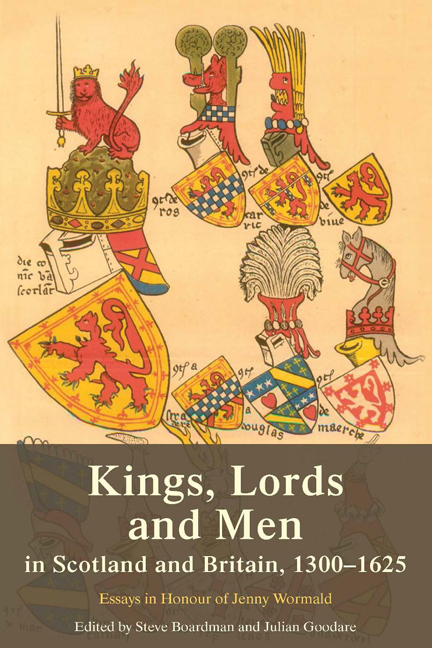Book contents
- Frontmatter
- Contents
- List of Illustrations
- Preface
- List of Abbreviations
- List of Contributors
- Introduction: Kings, Lords and Jenny Wormald
- 1 The Stewart Realm: Changing the Landscape
- Part I Lords and Men
- 2 Lords and Women, Women as Lords: The Career of Margaret Stewart, Countess of Angus and Mar, c.1354–c.1418
- 3 Bastard Feudalism in England in the Fourteenth Century
- 4 Tame Magnates? The Justiciars of Later Medieval Scotland
- 5 King, Lords and Men in Renaissance England: The Poetry of John Skelton
- 6 Rethinking the Justice of the Feud in Sixteenth-Century Scotland
- 7 Bonding, Religious Allegiance and Covenanting
- 8 ‘We Bund and Obleiss Us Never More to Querrell’: Bonds, Private Obligations and Public Justice in the Reign of James VI
- Part II Kings and Lords
- Publications of Jenny Wormald
- Index
6 - Rethinking the Justice of the Feud in Sixteenth-Century Scotland
from Part I - Lords and Men
Published online by Cambridge University Press: 15 December 2017
- Frontmatter
- Contents
- List of Illustrations
- Preface
- List of Abbreviations
- List of Contributors
- Introduction: Kings, Lords and Jenny Wormald
- 1 The Stewart Realm: Changing the Landscape
- Part I Lords and Men
- 2 Lords and Women, Women as Lords: The Career of Margaret Stewart, Countess of Angus and Mar, c.1354–c.1418
- 3 Bastard Feudalism in England in the Fourteenth Century
- 4 Tame Magnates? The Justiciars of Later Medieval Scotland
- 5 King, Lords and Men in Renaissance England: The Poetry of John Skelton
- 6 Rethinking the Justice of the Feud in Sixteenth-Century Scotland
- 7 Bonding, Religious Allegiance and Covenanting
- 8 ‘We Bund and Obleiss Us Never More to Querrell’: Bonds, Private Obligations and Public Justice in the Reign of James VI
- Part II Kings and Lords
- Publications of Jenny Wormald
- Index
Summary
The functioning of courts in dispensing civil and criminal justice can tell only part of the story of any dispute, and may often play no part at all. When invoked, however, court process is typically (if not always) a response to a dispute. The history of the administration of justice must therefore take into account the wider history of dispute resolution and settlement. This is not least because in a society such as that of late medieval Scotland a wide variety of methods of conducting a dispute tended to be used alongside each other. Thus the relationships between the various resolution or settlement mechanisms and the various ways a dispute was progressed – for example, resort to feud, formal litigation, criminal prosecution, arbitration, mediation, negotiation – have to be an essential focus of enquiry before the role played by any one method can be adequately understood. The work of Jenny Wormald has been exceptional in offering profoundly insightful and innovative ways of understanding disputes in late medieval Scotland, especially the relationship between what she has termed private and public justice.
A pioneering aspect of Wormald's overall thesis was to link the decline of the bloodfeud with the development of the Court of Session as a supreme civil court in Edinburgh. This admitted into the analysis a concern with the ways in which institutions of governance tried not only to control crime and disorder but also to provide for adjudication between disputing parties themselves. In this context the development of a central court in Scotland continues to raise significant but under-explored questions about the effect the strengthening of ‘public justice’ had on the well-established modes of ‘private justice’, as well as on the role of violence and on the underlying structures of social authority in the fifteenth and sixteenth centuries. The question derives further interest from Scotland's place in the parallel and more general European pattern of the ‘suppression of the noble feud by central governments in the sixteenth century’.
In Scotland, bloodfeud survived in a way which was not unique but which has been regarded as particularly well attested until the seventeenth century. It was a natural feature of a highly localised society deeply structured around lordship and kinship.
- Type
- Chapter
- Information
- Kings, Lords and Men in Scotland and Britain, 1300-1625Essays in Honour of Jenny Wormald, pp. 136 - 154Publisher: Edinburgh University PressPrint publication year: 2014



